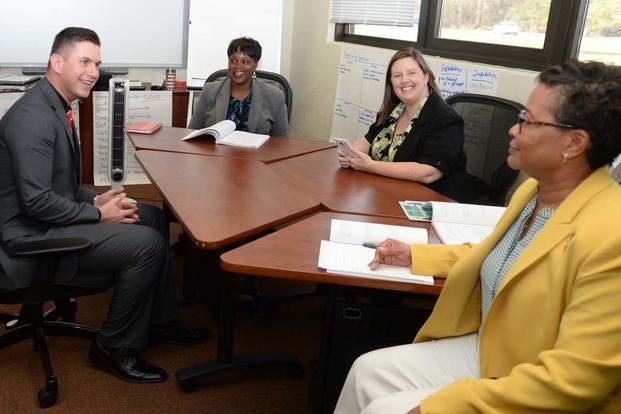It's important to understand what kind of interview you might be walking into, especially when it comes to panel interviews or group interviews. Some companies define them differently; some use the terms interchangeably.
The difference is in how many people are sitting on either side of the table.
In instances where the employer is seeking to hire many candidates, they might have one interviewer meet in a group setting with several applicants. A panel interview is more closely defined as a scenario where one candidate faces several interviewers at one time.
Companies conduct panel interviews for many reasons, including:
- Time savings. When everyone can meet the same candidate at the same time, multiple interviews can be avoided.
- Quicker decisions. If the interviewers can funnel several candidates through, they can get to a decision faster than having interviews on multiple days.
- Group think. Since everyone hears the same response (albeit through their own filters), the group can discuss how the candidate handled themselves, whether they'd fit in and the appropriateness of the responses.
Panel Interview Tips
For the panel interview, remember to:
Do your research in advance. Learn as much as you can about the company and its business (including mission, vision and competitors) before the interview. Scour their website and news articles featuring them. Also look at the LinkedIn profiles of each interviewer you'll meet with to learn about their backgrounds, interest and career.
Practice your elevator speech in advance. You may share your speech with someone in the elevator as you head to the meeting location, in the lobby while you wait for the interview to begin, or once you're inside the interview. Nail your speech down.
Anticipate various questions you might be asked. Role-play them with a friend who can assess your response and body language.
Arrive at the location 20 minutes early. Then spend 10 minutes in your car (or outside) reviewing your notes, resume and anything else you brought. Walk into the lobby 10 minutes early and keep your notebook closed until the meeting.
Have clean copies of your resume ready to hand out. You likely won't need them, but better to be prepared in case you do.
Upon entering the room, shake hands with each person on the panel. Look them in the eye when you greet them.
Maintain good eye contact during the interview. When someone asks you a question, begin your response by looking at them. Then make eye contact with everyone as you finish your response. End your response by looking at the person who initially asked the question.
Similarly, position your body to "point" at the person you're speaking to. Hold your position for several seconds, so they feel like you are speaking just to them. When it's time, subtly move to direct your body to the next person.
As you respond, or while listening to the questions, keep a smile on your face. Avoid tensing your face into a too-serious look. Relax your shoulders and keep your hands to your side or on the table, if you are taking notes.
Project confidence. Know the content of your resume, practice answering the questions, do your research on the company and interviewers, and feel confident in your ability to participate in the interview.
Never exaggerate or lie in an interview. Period.
Resist interrupting the person asking the question. Let them finish, then count two beats before you respond. You want to appear confident, not overly anxious.
Ask "does that address your question?" periodically. This clarifies that you did, in fact, answer the question they asked.
Clarify if you don't understand the question. Interviewers would prefer to restate the question rather than receive a misinformed response.
Don't assume you know who the decision-maker is in the room. In a panel situation, the decision could be made by the entire group or by one person. You may not know this in advance. Treat everyone in the room with equal respect.
Speak to men and women. Don't assume that the men in the room are the decision-makers. Again, treat everyone in the room with equal respect.
Review your questions and ask the ones that haven't been answered yet. Don't ask a question that was discussed previously.
Keep your composure if you get flustered. It's natural to get upset if you're thrown off kilter in a panel interview. As quickly as you can, take a deep breath, count to three, exhale and respond. The interviewers will see this as a sign that you know how to regain your composure in a stressful situation.
Thank each person as you leave. Exit just as you entered, thanking each person and making good eye contact.
Follow up with a thank-you note to each person. Yes, each person.
Want to Know More About Veteran Jobs?
Be sure to get the latest news about post-military careers as well as critical info about veteran jobs and all the benefits of service. Subscribe to Military.com and receive customized updates delivered straight to your inbox.








